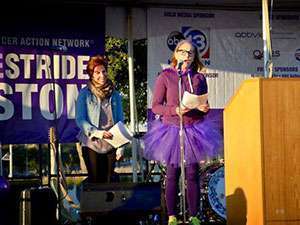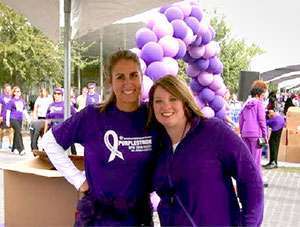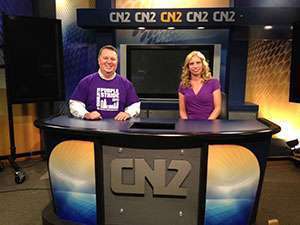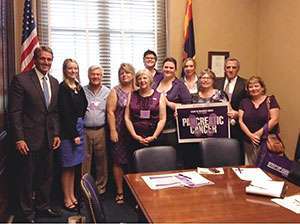From sharing their experience with patients and families, to organizing PurpleStride® and PurpleLight events, to advocating on Capitol Hill, volunteers serve as the life force of the Pancreatic Cancer Action Network. Thousands of volunteers put their spirit of hope into action year-round to support those coping with the disease and to raise awareness of it. We are honoring volunteers and their immense contribution during April, which is Volunteer Appreciation Month.
“Our legions of volunteers truly Wage Hope against pancreatic cancer every day,” said Angel Montanez, Director, National Affiliate Relations & Strategy. “They do so because they are driven by the fierce passion that comes from their personal experiences with the most deadly form of cancer.”

Mary Sharkey, 13-year survivor and Survivor and Caregiver Network volunteer, speaks about the importance of pancreatic cancer fundraising at the 2014 PurpleStride Houston.
These amazing women and men from across the country are focused on helping the Pancreatic Cancer Action Network reach the goal of doubling pancreatic cancer survival by 2020 by offering their time, talent and unstinting effort in many different ways.
Thirteen-year survivor Mary Sharkey decided to use her own experience with pancreatic cancer to help others battling the disease. When her pancreatic cancer went into remission, she followed her husband’s recommendation and called our Patient Services program to find out what she could do. “After the wonderful people at the call center helped me, I saw it as my responsibility to be there for others who were going through what I did,” said Sharkey.
A volunteer with the Survivor and Caregiver Network since 2002, Sharkey has been meeting with patients and their family members in person, on the phone and via email to share her story, discuss the latest medical news or simply to listen and comfort. “When those struggling with pancreatic cancer look into my eyes and hear that I’ve been a survivor for 13 years, it fills them with hope and helps them better cope with their journey.”
Caregivers also feel the call to do what they can. After Sonya Martin’s grandfather and two aunts had passed away from pancreatic cancer, she had enough and started looking for some course of real action to fight it. “I went to one of the organization’s educational lectures, and a month later I signed up to coordinate PurpleStride Dallas – Fort Worth,” said Martin.

PurpleStride Chair Sonya Martin (right) and Team Captain Katie Bloom celebrate the results of their efforts to organize the 2014 PurpleStride Dallas – Fort Worth.
While helping plan her first PurpleStride event, Martin carefully selected the survivor speaker, and after his speech, fellow survivors gave each other high-fives and hugs, which showed her how much these events meant to the community. “I was so inspired by seeing people come together in such a positive way while dealing with this devastating disease,” Martin said.
Since becoming a PurpleStride Chair in 2013, Martin has encouraged friendly competition among event volunteers and sought to make the whole process as much fun as possible. As a result, she’s seen her team members develop strong connections with each other through this cause.
“None of us chose to be here, but here we are,” said Martin. “And realizing that we are here together can make a big difference for all of us. Not every day is going to be sunny, but we can enjoy and comfort each other at events such as PurpleStride.”
The shared experience can also help caregivers with the healing process after losing a loved one. Over the course of a year, Shannon Gardner’s mother was in and out of hospitals with pancreatitis. Only eight days after she was diagnosed with pancreatic cancer, Gardner’s mother passed away. A friend from church invited Gardner to a PurpleStride event, where she ran the 5K for her mom. Then, in 2014, she attended Advocacy Day for herself. “Going to our nation’s capital for this event changed my life. Meeting volunteers, researchers, legislators and especially survivors from around the country gave me the heartwarming gift of fellowship.”

Mark Weber (Charlotte Media Relations Chair) interviews Shannon Gardner (Charlotte Volunteer Chair) on CN2 News in Rock Hill, S.C., about her mom’s cancer journey and volunteering for PurpleStride.
Gardner knew she wanted to do something for others with the knowledge, healing and inspiration she gained from Advocacy Day, which led her to become the first Volunteer Chair of the Charlotte Affiliate in January. Engaging new volunteers, organizing committee activities and sharing her journey with new caregivers and patients motivate her to try to help families feel less isolated and helpless. Gardner added, “When I meet survivors today, I can’t help but think about where their journey will go and how I might be able to support them along their way.”
During Advocacy Chair Megan Martin’s first meeting with Arizona Congressman Matt Salmon, she quickly established a valuable connection with him by sharing the pancreatic cancer journeys of several local constituents. Later, when he began a campaign on Capitol Hill to bring cancer research back to the forefront, he remembered that connection and called upon Martin to help. He was also aware of the successful work her local affiliate had done with pancreatic cancer, such as raising $90,000 during their first event without any sponsorships.
“I was honored that Congressman Salmon called for our input,” said Martin. “I remember that before the first time I met him, I didn’t think I would have the confidence to sit face-to-face with my U.S. representative and discuss the lack of pancreatic cancer awareness and research funding as well as share people’s heartbreaking stories – but I did.”

Phoenix Advocacy Chair Megan Martin (first row, third from right) with Arizona Senator Jeff Flake (far left) and fellow affiliate members at Advocacy Day 2014 in Washington, D.C.
Martin attributes that self-confidence to volunteering with the affiliate by mobilizing local advocates, organizing events, and speaking with supporters who know nothing about the cause. “I’ve learned a lot about myself and my capabilities. Part of the reason why is that everything we do as volunteers for this cause feels so necessary and vital. I know my time and skills are being utilized in such a critical way. There’s no internal conflict about whether or not this matters. I can see firsthand that it does.”
Making a worthwhile difference as a volunteer for the pancreatic cancer community can sometimes come down to just one person. Martin shared a story about the first PurpleStride event she helped organize, when a man who had just been diagnosed came to the event for the first time as well. He was on his own and didn’t know anyone. Martin said, “We asked him to join other survivors on stage, and in that moment, he found a whole community of supporters and realized he wasn’t alone in his fight.”
Connecting with fellow volunteers, survivors and caregivers, as well as forming a community of support, is what motivates many to continue and to grow with the organization for years. Sonya Martin noted, “The more we come together, and work together, the greater the impact we make.”
Sharkey agreed. “The strength of our united voice spurs more funding, more research, more clinical trials and more awareness, which ultimately leads to more survivors.”
Every person’s experience with pancreatic cancer can be meaningful, and as Gardner realized, “Your pancreatic cancer story becomes an asset that can benefit not only others but also you when you share it.”
It is extraordinary what can happen when one individual extends a hand to help others hit by this disease. After Pamela Acosta Marquardt lost her mother to pancreatic cancer in 1996, she went on to found the Pancreatic Cancer Action Network. When Julie Fleshman’s father passed away from the disease in 1999, she first joined the organization as a volunteer and today serves as president and CEO.
“Without our volunteers, we wouldn’t have been able to accomplish what we’ve done in such a relatively short period of time,” said Montanez. “They can see directly how their efforts are making a tremendous impact in their local communities and on the national level, with real-world results such as the Recalcitrant Cancer Research Act.”
Montanez continued, “Changing the course of pancreatic cancer, which is so overlooked and underfunded, has demanded the passionate and proactive attitude of our 90 volunteer communities across the country. Our volunteers move mountains every month, and we celebrate them throughout the year. But we are especially proud to honor them during Volunteer Appreciation Month in April, when we express our deepest appreciation for the miraculous things they do and the remarkable people they are.”
Volunteer with us today and tap into the power of YOU to benefit others.





